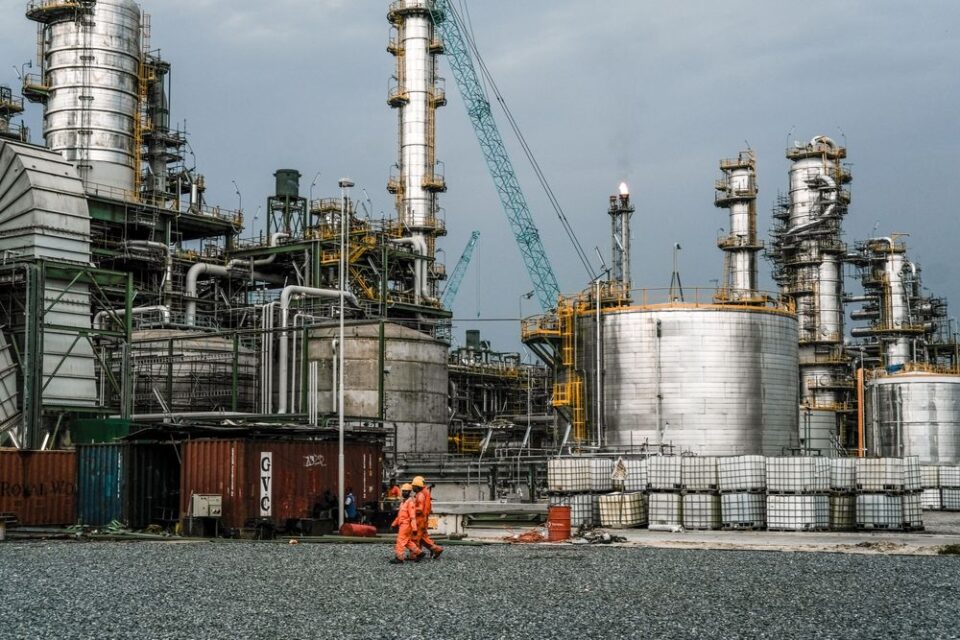Two academic researchers on the stable of public policy think-tank, Nextier, Dr. Chukwuma Okoli and Dr. Ndu Nwokolo have posited that the unveiling of Dangote Refinery to start local production of fuel and its byproducts has actually not solved the petroleum products dilemma of Nigerians.
Okoli, an Associate Consultant at Nextier and a Lecturer at the Political Science Department at Nnamdi Azikiwe University, Awka; and Nwokolo, a Managing Partner at Nextier and an Honorary Fellow at the School of Government at the University of Birmingham, UK also posited that rather than bring succour to suffering citizens, it has dampened the high expectation of Nigerians.
“For many Nigerians, the inauguration of the Dangote refinery and the eventual commencement of local production by the refinery is ‘something less than nothing.’ This is because the expectations that local refining would reduce fuel prices have not been realised.
“Instead, the commencement of lifting refined fuel from the Dangote refinery added to the suffering of Nigerians. It immediately led to an increase in the price of fuel following the adjustment of fuel price by NNPCL.
“This failure of the Dangote refinery to meet Nigerians’ expectations is connected to the rentier character of the Nigerian state, which has made Nigeria’s crude oil a source of affliction for the masses,” they asserted in their research report titled – ‘Public or Private Refinery in Nigeria: Something Less Than Nothing?’
While proffering solutions to the lingering crisis plaguing the energy sector, they advised the Federal Government to take immediate steps at implement full deregulation of the downstream sector of the oil economy by allowing other marketers to buy refined fuel from Dangote refinery.
According to them, given the visible inability of the Nigerian government to revive the publicly owned refineries, those refineries should be fully privatised to enable private investors with proven capacity to take over those refineries.
In their opinion, such practice will deepen competition in the downstream oil sector and reduce the challenges of shortages and price hikes.
The energy experts said the NNPCL should prioritise the supply of crude oil to the Dangote refinery for local production, stressing that the promise of selling crude oil in Naira to the Dangote refinery should also be kept to because of the possibility of reducing the price of refined products coming from the refinery.
They recalled that on May 22, 2023, when the $20 billion Dangote refinery was inaugurated in Lagos with great fanfare with a daily production capacity of 650,000 barrels, it was anticipated that local refining by the Dangote refinery would end Nigeria’s fuel importation.
He said contrary to this expectation, the opaque fuel subsidy regime, fuel shortages, price hikes, and many other challenges associated with the downstream sector of Nigeria’s oil industry has remained unabated.
“Over one year after the inauguration and with the commencement of production by the Dangote refinery on September 15, 2024, challenges relating to fuel importation and price hikes have remained features of the downstream sector of the Nigerian oil economy.
“Building a local refinery in Nigeria promises many opportunities for investors, the Nigerian government, and the general public,at least in theory.
“However, recent experience with the Dangote refinery in Nigeria tends to question the promises of local refining. Nigeria is currently the 13th largest crude oil producerglobally, with combined crude oil and condensate reserves reaching 37.50 billion barrels as of January 1, 2024. Nigeria is also one of Africa’s largest consumers of refined products, accounting for over 7% of Africa’s consumption of refined products. The country consumes over 17 billion litres of PMS annually, with transportation and power being the major drivers of demand for PMS”, their report stated.



